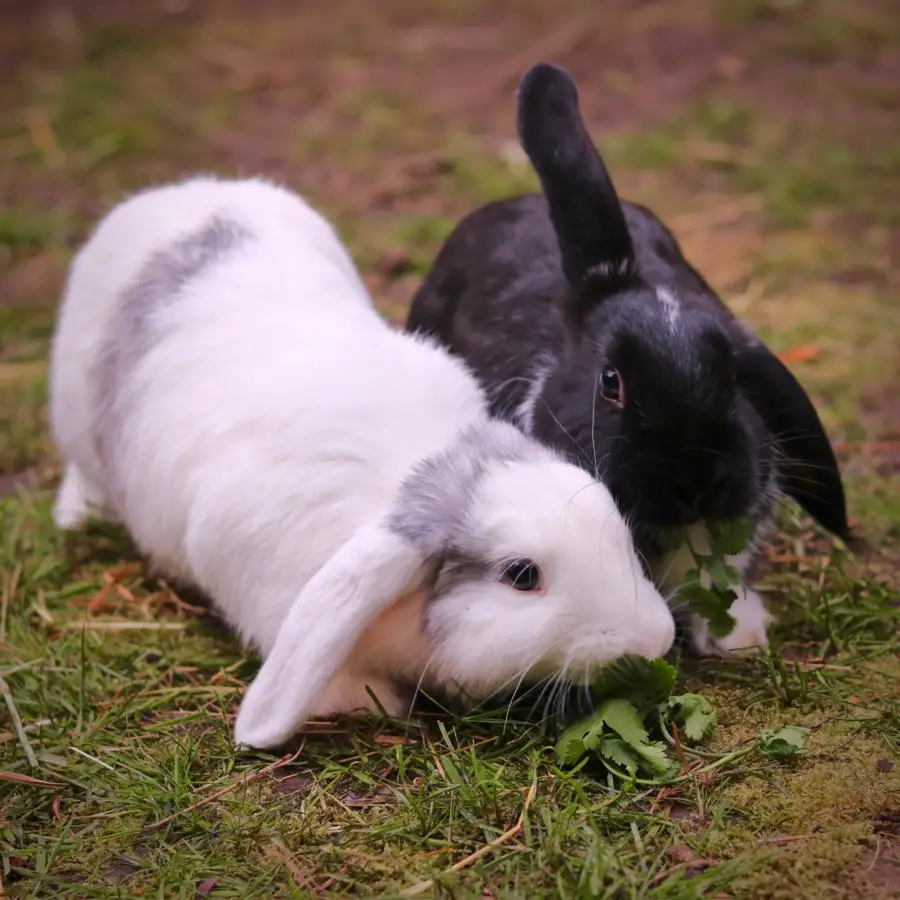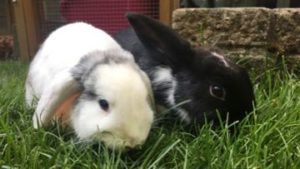Introduction
You love your rabbit. We love our rabbits, Fish and Chips. And we love giving them the best foods and treats we can. When we first got Fish and Chips, one of the first greens we bought was some fresh coriander, which they loved – eager to devour it. It complemented their main diet of Timothy hay well (why Timothy hay? Find out here). Great, let’s get some more herbs from the local supermarket – any will do, we thought. After all, can’t rabbits eat every type of herb? Big mistake.
There are many herbs which rabbits can enjoy, but a few (including one common one) are dangerous, and can lead to serious illness for your pet bunny. If you’re like me, you want to be able to wander down the vegetable aisle, pick up a pack of fresh herbs, and feel relaxed that your bunnies will be safe and enjoy the treat. So what herbs can I feed my rabbits? The short answer follows, and below that there are more details about how much to give and whether dried herbs are OK. You can also find out why some herbs are dangerous, and what to do if your rabbit eats some.
What herbs are safe for my rabbit?
The following herbs are safe for rabbits to eat:
- Basil
- Coriander (also called Cilantro)
- Dill
- Fennel
- Lavender
- Mint
- Mustard
- Oregano
- Parsley
- Rosemary
- Sage
- Tarragon
- Thyme
- Watercress.
Do not give your rabbit chives. This herb, along with spring onions, garlic or any food within the onion family, are all poisonous to rabbits.
If you are unsure about a food, check with your vet!
How much herbs should I feed my rabbit?
The main food we give Fish and Chips is hay – usually Timothy hay. Rabbits need unlimited supplies of this, and hay should make up about 85% of a rabbits diet. We also give up to an eggcup full a day of pellets. So any herbs you give will be in relatively small quantities. It’s good to mix it up a bit, and give some variety, so any herbs you give will be part of a larger diet including other fresh leafy greens and vegetables (like kale).
What does this look like in practice? For a 4lb (2kg) bunny, about 2 cups each day (either in one go, or spread out over different feedings). A cup is about the same as an adult handful of greens.
You also need to be careful with younger rabbits – their digestive systems are delicate, and they need time to adjust to new foods in their diet.
Can rabbits eat parsley?
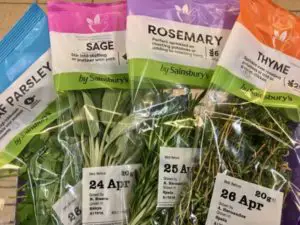
Rabbits can eat parsley safely as part of a sensible diet mainly based on hay. You can feed an adult bunny a handful of parsley as their daily allowance of greens.
Some people suggest that you need to be careful with how much parsley and fresh mustard you give your rabbit.
This is because parsley (along with some vegetables, like spinach) contains a relatively high level of a type of chemical called oxalates (you can see a table of the amount of oxalates in different vegetables here).
Oxalic acid, in huge quantities, could lead eventually to liver damage. However, this would require feeding your rabbit exclusively parsley (instead of hay) over a long period of time.
So long as parsley is not the major part of the diet (this should always be hay), it’s fine to give your rabbit parsley. For example, if you check out the PDSA advice on safe foods to give your pet rabbit, it includes parsley. It’s also on the approved list from the Royal Veterinary College.
I have also seen worries about whether the amount of calcium in parsley is too high for rabbits. Rabbits process calcium differently from most other animals, and too much calcium can lead to a variety of problems including urinary stones.
However, while parsley has higher calcium levels than some other foods, it isn’t particularly out of the ordinary (figures taken from this Rabbit Welfare Association article):
| Calcium levels – mg per 100g | |
| Kale | 130 |
| Spinach | 170 |
| Parsley | 200 |
| Spring greens | 210 |
| Mint | 210 |
This means that parsley has a calcium content of 0.17%. In contrast, Timothy hay typically has a calcium content of 0.4% – over twice as high – and your rabbit is going to eat far more hay than parsley.
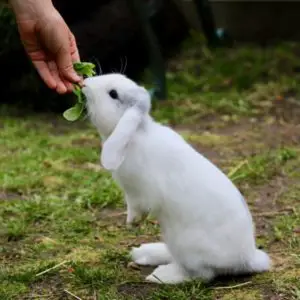
Your rabbit would need to eat about 10 small packets (30g – amount 1 oz) of fresh parsley in a day merely to reach the recommended daily allowance.
So you shouldn’t be concerned about the calcium content of parsley or other green vegetables unless your vet has recommend a specific diet for specific problems. (See also this article on calcium levels in various foods – the main takeaway is that you are far more likely to give too much calcium with pellets, and that it’s extremely difficult to give too much calcium with sensible amounts of green herbs).
And parsley contains a variety of other useful minerals and minerals. In particular, parsley is a good source of vitamin A and iron, both of which rabbits need in their diet. Find out more about the minerals and vitamins that rabbits need here.
The bottom line? As is often the case, parsley, like other foods, is fine in moderation. It is safe to give your rabbit parsley to eat.
Can rabbits eat thyme?
Rabbits can eat thyme safely as part of a sensible diet mainly based on hay.
I have seen some suggestions on the web that thyme can be helpful if your rabbit has diarrhoea. Whilst it may be true, I could find no evidence to back this up. More importantly, if your rabbit has diarrhoea, consult a vet straight away.
You can feed your rabbit both dried thyme and fresh thyme. This herb gives rabbits healthy quantities of the following nutrients: potassium, iron, magnesium, copper and vitamin A, and it is also high in fibre (check out more information on thyme’s nutrients here, and rabbit nutrition here). In short, thyme is an excellent herb to give to your bunnies providing many of the important minerals and vitamins they need.
Can rabbits eat cilantro / coriander?
Rabbits can eat cilantro (coriander) safely as part of a sensible hay based diet. You can feed both the stem and the leaves of coriander to bunnies. The herb is an excellent addition to give variety to your rabbit’s diet, helping ensure their nutrition is balanced. A handful of cilantro / coriander is about a serving for a mature rabbit.
Cilantro (coriander) is a great source for bunnies of vitamin K, copper, potassium and iron. We have a detailed post if you’re interested in finding out more about the nutritional needs of rabbits.
In fact, coriander is our bunnies’ favourite herb. When we give our rabbits a handful, they gobble it down.
Can rabbits eat rosemary?
Rabbits can eat rosemary safely as part of a sensible diet mainly based on hay and fresh water. You can feed both the stalk (sprigs) and the leaves to bunnies. Rosemary is a great herb to give to rabbits, providing variety to their diet and helping to ensure that they have a balanced nutrition. A handful (a few sprigs) is a portion for a day for a mature rabbit.
However, not all bunnies will like rosemary. Some rabbits dislike strong smelling herbs, so don’t worry if your bun turns up their nose.
If your bunny does like rosemary, you can be happy knowing that it will provide your rabbit with vitamin A and potassium, along with some fibre.
Can rabbits eat sage?
Rabbits can eat sage safely as part of a varied diet mainly based on hay and fresh water. You can feed bunnies both the leaf and stem of sage. Sage is a source of potassium, iron and vitamin K to rabbits. A portion size is a handful of leaves.
Sage has a historical reputation of being a healing herb – in mediaeval times, it was also known as ‘sage the saviour’ (Salvia salvatrix), and to the Romans it was the holy herb. Sage was used to treat everything from the plague to wasp stings.
While modern medicine doesn’t consider sage a miracle drug in the way that the past might have, it’s still a great herb for your bunny to eat.
Can rabbits eat dill?
Rabbits can eat dill (also known as dill weed) safely as part of a diet with lots of variety but mainly based on hay and fresh water. Dill is a good source of iron, magnesium, potassium and vitamin A for rabbits. You can give about a handful of dill as a portion size for an adult rabbit.
Humans have been eating dill for thousands of years (it was found in an Egyptian pharaoh’s tomb from 1400 BC). It is likely that rabbits have been nibbling away at dill in the wild for just as long.
Given all the nutrients in dill, it’s a good herb for your bunny to eat occasionally (if they like it – rabbits can be picky eaters).
Can rabbits eat mint?
Rabbits can eat mint safely as part of a diet that consists mainly of hay and fresh water. Mint is a good source of iron, magnesium, potassium, copper, manganese, and vitamin A in the right amounts for bunnies (find out more about what vitamins and minerals rabbits need here).
Mint has a reputation of being good for soothing stomach upsets in humans, backed up by medical trials. It also works as a cure for asthmatic rats (because it contains rosmarinic acid). It’s no surprise, therefore, that many owners suggest that mint helps their rabbits when they have stomach upsets (for any kind of serious upset, though, go straight to a vet).
All in all, mint is a great herb to give your rabbit. It’s healthy, nutritious, and might have some beneficial medical properties.
Can I give dried herbs to my bunny?
You can give dried herbs to rabbits as part of a varied, healthy diet. People sometimes want to mix in some dried herbs with other foods (including hay, or pellets). You can even buy some types of hay with herbs mixed in (some bunnies love this, others don’t). Again, moderation is the key. And you shouldn’t give dried herbs instead of fresh greens.
What about wild herbs?
I’m not an outdoor type, so I wouldn’t particularly recognise wild herbs if I came across them anyway. I get my herbs from the supermarket. But I found this list of plants to avoid. Some people like foraging – if that’s you, it’s probably best to decide on four or five plants that you recognise and know are safe, and collect them.
Why are some herbs dangerous for rabbits?
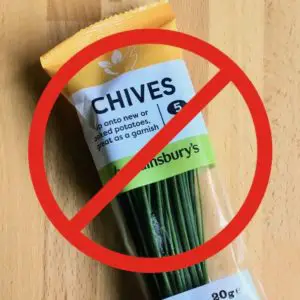
Chives are dangerous for rabbits because they can lead to gut problems and blood problems.
Along with other plants in the onion family (allum family) such as spring onions, onions and garlic, chives can lead to haemolytic anaemia (the red blood cells in the body become more fragile and some rupture) in many animals, including rabbits. The effects don’t happen instantly, but can take place over a period of days.
An oxidising substance called n-propyl disulphide binds to the sides of red blood cells, is recognised as a foreign body by other cells, so the red blood cell is destroyed.
Seek out professional advice from a vet if your rabbit eats chives or anything similar.
Humans are much less sensitive to this than other animals, which is why we can enjoy chives and garlic, and our pets can’t.
What should I do if my bunny eats a dangerous herb?
If in any doubt, contact your vet for advice.
Conclusion
Most herbs, including parsley, are safe for our bunnies. Fish and Chips love the various green herbs that we give them, along with other greens, as part of their diet. We get small packets regularly from our supermarket. They provide nutrients and flavours for our pet rabbits.
If you’re giving a sensible amount as part of a diet mainly based on hay, you don’t need to worry about oxalate content or calcium content – so parsley is fine along with all the others on the safe list. But make sure that you avoid chives – they are dangerous for your rabbit.
As you care about your bunny’s diet, check out our page on what fruit you can safely give your rabbit as a treat (and how much), and our page on why Timothy hay is so good for your rabbit.
You can also check out more about what vitamins and minerals rabbits need for a healthy life.
If you want to make sure you can always afford the best care for your rabbit, check out our page on pet rabbit insurance here.
Where can I find more information?
If you go searching on internet forums, you’ll end up with all sorts of conflicting advice about diet, and what foods are bad or good for your bunny. There are a lot of myths out there. Instead, I stick with the sites with some authority for my information. Here are some of the ones I consulted:
RSPCA advice about diet for rabbits
The PDSA (a leading veterinary charity) advice about safe vegetables for rabbits
The PDSA also have this download about feeding rabbits (opens pdf file)
The Rabbit Welfare Association has a page on recommended vegetables and herbs

